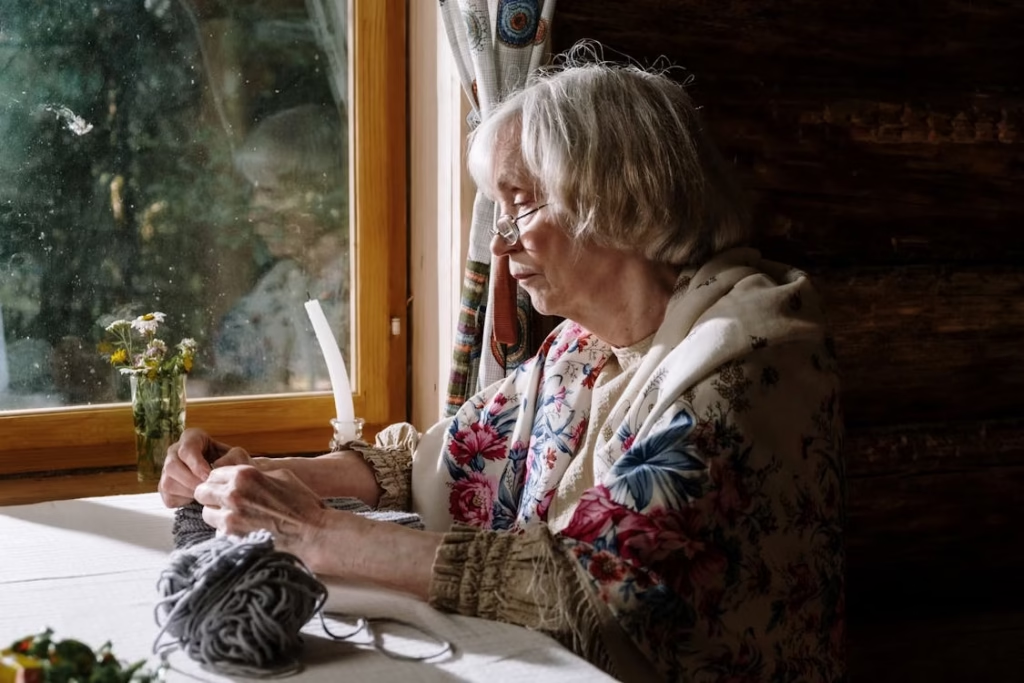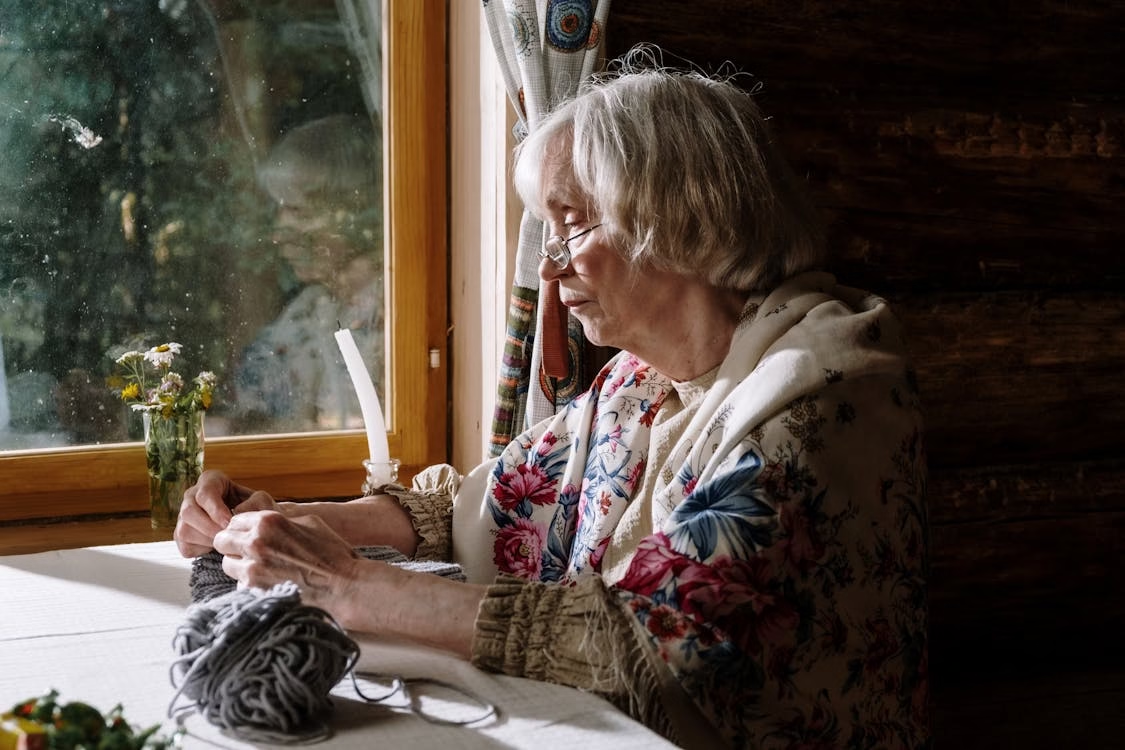My Wife’s Knitted Sweaters For Our Grandchildren Ended Up in a Thrift Store—Her Heartbreak Made Me Teach Them a Lesson
I’ve come to realize that if you truly want to convey a message to someone, you often need to move past just gentle nudges or basic consequences. In my situation, addressing my grandchildren’s careless behavior required a response that was more enlightening than simply putting them on restriction. They had to understand a meaningful lesson about respect and gratitude, particularly after the pain they caused my wife, Jenny.

I’m Clarence, 74 years old, and I’ve been happily married to Jenny, who is 73, for what seems like forever. She has always been the gentle heart of our family, consistently expressing her love through endless acts of kindness. Each year, without fail, Jenny dedicates her time and patience to creating the most beautiful, carefully hand-knitted sweaters for our grandchildren. It has turned into a beloved tradition: birthdays, Christmas, and other special moments—all celebrated with the arrival of one of Grandma’s carefully crafted gifts. At times, it’s a sweater featuring a special pattern chosen specifically for that child; other times, it’s a soft plush toy or a warm blanket. The kids always understood that these gifts were something special, with every stitch made with love and attention.
However, last week, my belief in their appreciation was completely broken. Jenny and I were at our favorite thrift store, searching for some vintage pots to add a little charm to our garden project. What was meant to be a lovely day—digging through forgotten gems, reflecting on the good old days. As we strolled through the aisles, Jenny abruptly came to a halt. Her eyes grew wide, and her face turned ashen. With a trembling hand, she gestured towards a rack of sweaters.
“Clarence,” she whispered, her voice shaking, “is this really what I think it is?”
Amidst a jumble of discarded clothing, I spotted several cherished items—sweaters that Jenny had lovingly crafted for our grandkids. One design, a striped blue and grey creation she had completed just last Christmas for our oldest granddaughter, caught my eye right away. The sight hit me hard, like a punch to the gut. I understood the depth of love woven into each sweater, how Jenny dedicated countless hours selecting the yarn, designing the pattern, and meticulously knitting it into something truly special. It broke her heart to see these gifts tossed aside, sold off as if they were nothing more than cheap trinkets.
Jenny attempted to mask her pain, offering a faint smile as she softly caressed one of the sweaters. “It’s okay,” she said, trying to keep her voice steady. “Perhaps the kids felt a bit shy about wearing the things I made by hand.” “Perhaps they just outgrew them or something…” Yet, I understood her more deeply than that. I noticed the tears she was desperately trying to keep at bay. This was far from acceptable.
In that moment, I held back my words because Jenny needed calm and reassurance, not the outburst of my anger. But deep down, I was boiling with anger. How could they do that? Each piece was a gift from their grandmother, a true reflection of her unwavering love. Later that night, after making sure Jenny was sound asleep and wouldn’t wake up, I headed back to the thrift store. I bought every single one of those sweaters, regardless of the price. I couldn’t just leave them there like forgotten scraps.
Now that I had the sweaters back in my possession, I started to come up with a plan. Getting the grandchildren grounded could have been a good beginning, but it seemed a bit too simple. A brief punishment won’t address the underlying problem. They had to grasp the significance of what they had discarded. They had to feel the hard work, commitment, and love that come with creating something by hand.
The following morning, I got everything ready for each grandchild, thoughtfully placing a few balls of wool, a pair of knitting needles, and some simple instructions into their packages. Along with these tools, I added a picture of the original sweater Grandma had crafted and a serious note from me:
“I know what you did,” I penned down. “If you believe these gifts hold no value, then go ahead and try creating them on your own.” Grandma and I will be over for dinner soon, and I can’t wait to see you in something you’ve knitted yourself. If that’s the case, I’ll definitely let your parents know how you handled Grandma’s gifts—and I’ll ensure that no more presents come your way, whether it’s for your birthday or Christmas.
I carefully sealed each package and sent them on their way. In the days that came after, I received calls from a few of the grandchildren—each voice filled with hesitation, a touch of embarrassment, and a hint of apology. They confessed that they had never truly considered the time and effort that went into making those sweaters. Some people stayed quiet, likely feeling too embarrassed to speak up. But I could tell my message was getting through.
As the evening of our much-anticipated family dinner approached, Jenny and I walked into a room filled with palpable tension. The grandchildren came in one at a time, each proudly sporting a piece they had tried to knit. The results were quite something, to say the least. Some people had on lumpy sweaters, with one sleeve hanging longer than the other. Some people wore strange scarves that resembled nets more than anything cozy for their necks. It turned into a showcase of funny knitting blunders, and even though the lesson was quite serious, I found myself laughing at their sincere efforts.
Yet, hidden beneath the humorous blunders, I noticed something real: a sense of regret, a newfound understanding, and a profound gratitude for everything Jenny had contributed over the years. They stumbled over their words, saying, “We’re really sorry, Grandma.” We had no idea how challenging it was or how much love you poured into each stitch.
My wife, with her kind heart, just wrapped her arms around me and held me close. She wasn’t looking for revenge; she simply wanted understanding and a fresh sense of connection. “It’s okay,” she murmured gently. “What truly counts is that you’ve come to appreciate the heartfelt gifts that have been bestowed upon you.”
Later that night, Jenny radiated pride and relief as she gazed at me in wonder. “I can’t believe you managed to get them to do all this!” she exclaimed. I gave a little shrug and smiled. “I needed to demonstrate that what you craft goes beyond mere fabric and yarn—it embodies love and effort brought to life.”
The mood brightened, laughter took the place of worry, and everyone vowed to treasure Grandma’s handmade gifts for all time. To wrap things up, I had one final surprise in store. I stepped outside to the car and came back with some big bags. Inside were all the original sweaters I had rescued from the thrift store. The kids’ eyes lit up with surprise and appreciation. They swiftly swapped out their lackluster outfits for Jenny’s flawless designs.
“Thank you, Grandma and Grandpa!” they exclaimed, pulling us into a warm group hug. As the tension faded away, we enjoyed the rest of the evening over a meal brimming with stories, laughter, and heartfelt promises to cherish one another more than ever.
Now, let me shift gears and share another story—a lesson learned in a different home, where a husband found himself in need of a wake-up call regarding boundaries and respect.
This story is about a couple who have been married for six years. The wife, a dedicated software engineer, put in long hours to provide for the family, while her husband, Patrick, took on the role of staying home to look after their kids. It was a reasonable deal, but it needed trust and understanding—qualities that started to fade as Patrick picked up a troubling habit.
Patrick began to use his wife’s credit card without asking her first. Initially, it started with little things, but over time, he moved on to fancier buys. When he decided to splurge on a fancy, top-of-the-line gaming chair without consulting her first, it was obvious that his choice was causing tension in their marriage.
Feeling exhausted from endless arguments that seemed to go in circles, the wife resolved it was time to give Patrick a lesson he wouldn’t forget. She could tell he was eager to flaunt his new gaming chair at the game night with his friends. She flashed a sly smile and suggested hosting the gathering. Patrick was over the moon—he pictured himself wowing everyone with his opulent new throne.
As the night of the event unfolded, Patrick’s friends showed up, filled with laughter and playful banter as they made their way to the gaming area. Instead of the fancy chair they were hoping for, they ended up with an old, uncomfortable one. Patrick’s expression was one of pure disappointment, and as laughter echoed around the room, his wife softly reminded him of that feeling when expectations suddenly shift without any warning or agreement.
Once the guests had departed, Patrick and his wife engaged in a deep and sincere conversation. He expressed his regret for being inconsiderate, coming to terms with the fact that he had overlooked her trust and the financial responsibilities she had shouldered. They discussed boundaries, respect, and how crucial it is to take each other’s feelings into account. From that day on, Patrick always made sure to ask before using her credit card.
This wake-up call ignited something within Patrick. He started focusing his energies on a more creative path, working on a computer game as a personal project. With a fresh sense of purpose and a deep respect for their partnership, his creativity blossomed, and together they became stronger than ever.
These two stories have something in common: the impact of a thoughtfully delivered lesson. Sometimes, it takes a little jolt for people to truly grasp the impact of their actions. Whether it’s grandchildren discovering the value of handmade gifts as they try their hand at crafting, or a husband coming to terms with the significance of financial respect after an unexpected turn of events, these moments can lead to important realizations.
Ultimately, these challenging lessons strengthened connections instead of breaking them apart. The grandchildren came to appreciate the hard work their grandmother put in, while Patrick gained a deeper respect for his wife’s trust and the boundaries she set. Challenges turned into chances for growth, and every family came out stronger, more grateful, and more respectful than they had ever been.
Summarized:
Clarence, a 74-year-old woman who is happily married, has spent years navigating the careless behavior of her grandchildren. Jenny, their grandmother, has always been the gentle heart of their family, expressing her love through endless acts of kindness. Each year, Jenny dedicates her time and care to creating the most stunning, carefully hand-knitted sweaters for her grandchildren. It has turned into a beloved tradition, where birthdays, Christmas, and other special moments are celebrated with the arrival of one of Grandma’s carefully crafted gifts.
Last week, Clarence’s belief in their value was crushed when they spotted the sweaters tossed aside at a nearby thrift store. The grandmother understood the love woven into each sweater, and witnessing them tossed aside like mere objects shattered her heart. She struggled to conceal her pain, yet the tears she desperately tried to suppress were undeniable.
The grandmother made up her mind to purchase every sweater in the store, regardless of the price, to bring them back home. She came up with a plan to ground the grandchildren, but it seemed almost too simple. A brief punishment won’t address the underlying problem. They had to grasp the value of what they had discarded and truly feel the effort, commitment, and love that are poured into creating something by hand.
The following morning, Clarence got ready by putting together packages for each of his grandchildren. He included a few balls of wool, a pair of knitting needles, and some simple instructions. Along with these tools, she added a picture of the original sweater that Grandma had crafted and a serious note from her grandmother. She said, “I know what you did,” and reminded the grandchildren that if they believe these gifts are worthless, they should give making them a try themselves. If they don’t, she’ll ensure their parents are fully aware of how they treated Grandma’s gifts, and she’ll make certain that no more presents come their way, whether for birthdays or Christmas.
After sealing each package and sending them off, Clarence started getting calls from a few of the grandchildren. They confessed that they had never truly considered the time and effort that went into making those sweaters. Some people just stayed quiet, likely feeling too embarrassed to speak up. Yet, she could tell her message was getting through.
During a family dinner, the author shares a delightful story about the grandchildren trying to knit something special from their grandmother’s heart, leading to a series of amusing blunders. Yet, the author’s wife, a devoted parent for many years, expressed heartfelt regret and gratitude for the gifts she received. She shared that the important thing is to make the gifts visible, and the children were truly amazed by the effort that went into creating them.
As everyone made their promises to treasure the handmade gifts, the tension melted away. The author came back with big bags full of the original sweaters, and the children eagerly turned them into Jenny’s ideal creations. The tension faded away, and the family enjoyed the rest of the evening filled with stories, laughter, and heartfelt promises to cherish one another more than ever.
Another story centers on a married couple, Patrick, who found himself in need of a wake-up call regarding boundaries and respect. Patrick, a dedicated software engineer, put in a lot of effort to provide for the family, while his husband, also named Patrick, took on the important role of staying home to look after their kids. Despite their love for each other, their marriage faced challenges because Patrick often used his wife’s credit card without asking her first. Their marriage began to feel the pressure from this situation.
Patrick’s wife wanted to give him a lesson he wouldn’t forget, so she organized a game night with friends. However, instead of splurging on a fancy gaming chair, they ended up with an old, uncomfortable one. Patrick was reminded by his wife of the hurt that comes when expectations are flipped unexpectedly and without agreement. Once the guests had departed, Patrick expressed his regrets for being inconsiderate and engaged in a conversation about boundaries, respect, and the significance of being mindful of one another’s feelings. After that day, Patrick always made sure to ask before using his wife’s credit card.
This wake-up call ignited Patrick’s creativity, inspiring him to create a computer game as a personal project. With a fresh sense of purpose and a deep respect for their partnership, his creativity blossomed, and together they grew stronger than ever.
Both stories highlight the impact of a thoughtfully delivered lesson. From grandchildren discovering the value of handmade gifts as they try their hand at crafting, to a husband coming to understand the significance of financial respect after an unexpected turn of events, these challenging lessons have strengthened connections instead of breaking them apart. The grandchildren came to appreciate the hard work their grandmother put in with love, and Patrick gained a deeper respect for his wife’s trust and the boundaries she set. Challenges turned into chances for growth, and every family came out stronger, more united, and filled with gratitude and respect for one another than ever before.




